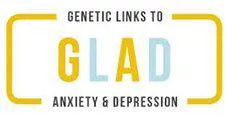GLAD: Genetic Links to Anxiety and Depression
Aims:
The GLAD Study is the largest anxiety and depression project ever undertaken. The study is part of the National Institute of Health Research (NIHR) BioResource. It is led by researchers at King’s College London, in collaboration with researchers at Ulster University, University of Edinburgh, and Cardiff University. GLAD was launched in September 2018, and over 30,000 participants have fully enrolled.
Depression and anxiety are the most common mental health disorders worldwide. One in three people will experience one of these conditions during their lifetime. Despite the availability of treatments, only half those treated recover fully. It is therefore important to gain a deeper understanding of these illnesses, and to work out which treatments work for whom and why.
The main aim of the study is to improve our understanding of the risk factors for depression and anxiety in order to find effective treatments and improve the lives of people experiencing these disorders. All participants agree to be contacted for future research studies, and we hope this will enable numerous other studies shedding light on factors relevant to the development and treatment of these conditions.
Recruitment takes place online. Anyone who has experienced clinical anxiety or depression (including those with a diagnosis of bipolar disorder, OCD and OCD- related disorders) during their lives who is willing to get involved in research can register on the website. They then complete the consent form, fill in our questionnaires and provide a saliva sample from which we collect their DNA.
By investigating the genetic influences on depression and anxiety, we hope to find effective treatments and improve the lives of people experiencing these disorders.
Acknowledgement of sensitive research:
- The GLAD team and partners recognise that research involving genetics is especially sensitive and as such, we have a responsibility to be transparent about how we collect, analyse and store your data, as well as who has access to this.
- We understand that individuals from many different ethnic minority communities are underrepresented in research studies, both as research participants and as researchers, and that this lack of representation has roots in historic injustice and systemic racism towards these groups. GLAD is committed to prioritising this issue by engaging in discussions with different communities and taking necessary steps to improve representation in our team and our participants.
- We will never knowingly share data with projects that intend to link genetics to race. Our team firmly states that the social construct of race is not based on science and that this idea has no place in our research. Within our research, You’ll find we use the term “ancestry” over “race” or “ethnicity” when discussing genetics research. Race and ethnicity are not valid indicators for any underlying biological differences between individuals (e.g., genetics). For these reasons, racial categories and ethnic groups should only be used when discussing social constructs such as racial or cultural experiences.
Overview publication:
Davies, M. R., Kalsi, G., Armour, C., Jones, I., McIntosh, A., Smith, D. J., Beange, I., Brailean, A., Cleare, A. J., Coleman, J. R. I., Curtis, C. J., Curzons, S. C. B., Davis, K. A. S., Downey, L., Gault, V., Goldsmith, K. A., Hammond Bennett, M., Hirose, Y., Hotopf, M. H., Huebel, C. Leng, J., Mason, B. D., McAtarsney-Kovacs, M., Monssen, D., Palaiologou, E., Pariante, C. M., Parikh, S., Peel, A. J., Price, R., Rimes, K. A., Rogers, H. C., Skelton, M., Spaul, A., Almira Suarez, E. L., Sykes, B. L., Thomas, K., White, K. M., Young, A.,Vassos, E., Veale, D., Wingrove, J., Eley, T. C. & Breen, G. D. (2019) The Genetic Links to Anxiety and Depression (GLAD) Study: online recruitment into the largest recontactable study of depression and anxiety, Behaviour Research and Therapy. 123, 103503
Some examples of our work on the genetics of anxiety, depression, treatment seeking and treatment outcomes are provided below:
Di Gessa, G., Maddock, J., Green, M., Thompson, E., McElroy, E., Davies, H., Mundy, J., Stevenson, A., Kwong, A., Griffith, G., Katikireddi, S., Niedzwiedz, C., Ploubidis, G., Fitzsimons, E., Henderson, M., Silverwood, R., Chaturvedi, N., Breen, G., Steves, C., Steptoe, A., Porteous, D., Patalay, P. (2022). Pre-pandemic mental health and disruptions to healthcare, economic and housing outcomes during the COVID-19 pandemic: Evidence from 12 UK longitudinal studies. The British Journal of Psychiatry, 220, 21-30. doi:10.1192/bjp.2021.132.
Davies, M. R., Buckman, J. E., Adey, B. N., Armour, C., Bradley, J. R., Curzons, S. C., Davis, K. A. S., Goldsmith, K. A., Hirsch, C. R., Hotopf, M., Hübel, C., Jones, I. R., Kalsi, G., Krebs, G., Lin, Y., Marsh, I., McAtarsney-Kovacs, M., McIntosh, A. M., Monssen, D., Peel, A. J., Rogers, H. C., Skelton, M., Smith, D. J., Ter-Kuile, A., Thompson, K. N., Veale, D., Walters, J. T. R., Zahn, R., Breen, G., & Eley, T. C. (2021). Comparison of algorithm-based versus single-item diagnostic measures of anxiety and depression disorders in the GLAD and COPING cohorts. medRxiv. https://doi.org/10.1101/2021.01.08.21249434
Thompson, K. N., Hübel, C., Cheesman, R., Adey, B. N., Armour, C., Davies, M. R., Hotopf, M., Jones, I., Kalsi, G., McIntosh, A. M., Monssen, D., Peel, A. J., Rogers, H. C., Skelton, M., Smith, D. J., Walters, J. T. R., Breen, G. & Eley, T. C. (2021). Age and sex-related variability in the presentation of generalised anxiety and depression. Depression Anxiety, 38, 1054-1065. https://doi.org/10.1002/da.23213
Peel, A. J., Armour C., Buckman J. E. J., Coleman J. R. I., Curzons S. C. B., Davies M. R., Hübel C., Jones I., Kalsi G., McAtarsney-Kovacs M., McIntosh A. M., Monssen D., Mundy J., Rayner C., Rogers H. C., Skelton M., ter Kuile A., Thompson K. N., Breen G., Danese A.* & Eley* T. C. (2021). Comparison of depression and anxiety symptom networks in reporters and non-reporters of lifetime trauma in two samples of differing severity. Journal of Affective Disorders Reports, 6, 100201. https://doi.org/10.1016/j.jadr.2021.100201
Coleman, J.R.I., Peyrot, W.J., Purves, K.L., ...Hotopf, M., Eley, T. C*., Breen*, G. (2020). Genome- wide gene- environment analyses of major depressive disorder and reported lifetime traumatic experiences in UK Biobank. Molecular Psychiatry, 25, 1430- 1446. https://doi.org/10.1038/s41380-019-0546-6
Purves, K. L., Coleman, J. R. I., Meier, S.M., Rayner, C., Cheesman, R., ... Breen*, G., Eley, T. C*. (2020). A major role for common genetic variation in anxiety disorders. Molecular Psychiatry, 25, 3292–3303. https://doi.org/10.1038/s41380-019-0559-1
Rayner, C., Coleman, J.R.I., Purves, K.L., Cheesman, R., Huebel, C., Gaspar, H.A., Glanville, K.P., Krebs, G.C., Morneau-Vaillancourt, G., Breen, G., Eley, T. C. (2019). Genetic influences on treatment- seeking for common mental health problems in the UK biobank. Behaviour Research and Therapy, 121, 103413. https://doi.org/10.1016/j.brat.2019.103413
Keers, R., Coleman, J., Lester, K., Roberts, S., Breen, G., ... Eley, T. C. (2016). A genome-wide test of the differential susceptibility hypothesis reveals a genetic predictor of differential response to psychological treatments for child anxiety disorders. Psychotherapy and Psychosomatics, 85, 146-158.



